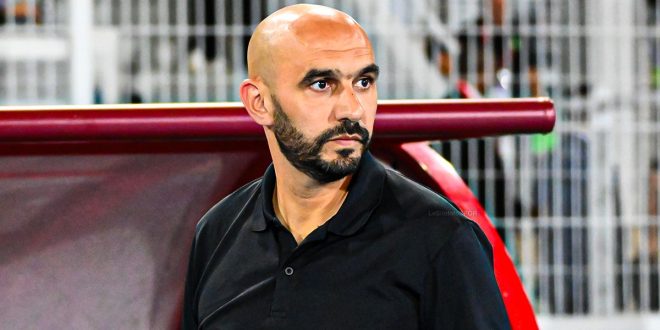Morocco secured its fifth consecutive victory in the 2026 World Cup qualifiers on Tuesday, extending its unbeaten run to 11 official matches.
Despite the impressive results, national team coach Walid Regragui continues to face skepticism from sections of the Moroccan fanbase.
The Atlas Lions defeated both Niger and Tanzania in Oujda, putting themselves within touching distance of World Cup qualification.
Statistically, Regragui’s record since the Africa Cup of Nations has been impeccable—six wins from six AFCON qualifiers, making Morocco the only team to finish with a perfect 18 points.
His side has also been prolific in front of goal, scoring 26 times, 10 more than their nearest challengers, Algeria and South Africa.
In World Cup qualifying, Morocco has maintained a flawless record, with three matches remaining in September and October against Niger, Zambia, and Congo.
Yet, despite these successes, criticism persists.
A shift in expectations
Following the victory over Tanzania, Regragui acknowledged a change in how Moroccan fans perceive success.
“People no longer celebrate World Cup qualification like they did in 2018 and 2022,” he remarked, recalling how supporters once filled the streets when Morocco secured a place at the Africa Cup of Nations.
The coach emphasized that securing a third consecutive World Cup appearance should be a source of national pride.
However, the reality is that the expanded 48-team format—offering Africa nine direct qualification spots—has made reaching the tournament more straightforward for the continent’s top teams.
Historically, Morocco’s road to the World Cup was far more challenging.
The 1994 qualifiers, for example, saw the Atlas Lions navigate multiple group stages before facing a decisive showdown with Zambia, where Abdessalam Laghrissi’s goal in Casablanca sealed their place in the United States.
The 2002 campaign was equally grueling, with Morocco locked in a fierce battle against Senegal, Algeria, Egypt, and Namibia, ultimately missing out after a crucial defeat in Dakar.
Regragui himself experienced heartbreak as a player during the 2006 qualifiers.
Despite an intense battle with Tunisia, Morocco narrowly missed out on a World Cup spot in a group that also featured Guinea, Kenya, Malawi, and Botswana.
Modern football, different challenges
The landscape of African football has evolved.
Matches are now played in better conditions, with improved infrastructure and scheduling.
Many African teams host games in Morocco due to their own stadiums falling short of CAF and FIFA standards, a stark contrast to the past when teams battled on poor pitches in extreme temperatures.
While Regragui’s record is commendable, his insistence on framing World Cup qualification as an “achievement” has not resonated with all Moroccan supporters.
With qualification now expected rather than celebrated, fans are eager to see the Atlas Lions consistently compete against Africa’s elite—Senegal, Nigeria, Egypt, and Cameroon—to truly assess their standing on the continent.
Criticism and the changing face of Moroccan support
Regragui remains a divisive figure. Some supporters criticize his squad selections, accusing him of favoring certain players or overlooking talent from their preferred clubs.
Social media has amplified these debates, with some even calling for his dismissal despite his remarkable winning streak.
Demanding the removal of a coach with such an outstanding record would be premature, but healthy scrutiny of his tactical decisions and long-term vision is justified.
Regragui must balance acknowledging his successes with managing expectations, ensuring Morocco continues its upward trajectory on the international stage.











